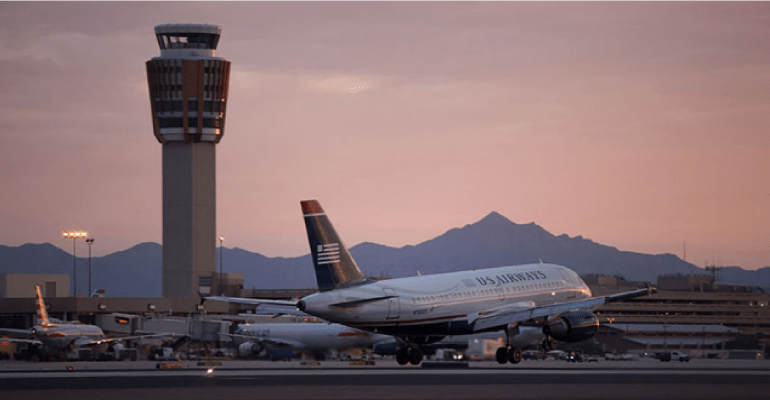
WASHINGTON – President Donald Trump’s plan to privatize operations of the nation’s air traffic control towers – including at least six in Arizona – will help speed upgrades to a system that has been slow to modernize, the White House said Monday.
The announcement was welcomed by some aviation groups, who said it will “get government out of the way” in the push for modernization, while others questioned the need to tinker with what they said is already the most-advanced air traffic control system in the world.
The president of the union representing the nation’s air traffic controllers was more blunt.
“Don’t trust Trump,” said Ron Taylor, president of the Professional Air Traffic Controllers Organization.
“Trump is a business guy and is followed by money,” Taylor said. “It’s smoke and mirrors, I don’t trust Trump. He’s not pro union and he’ll probably end up costing a lot of jobs.”
The proposal to separate the air traffic control from the Federal Aviation Administration and put it under a “not-for-profit, non-governmental entity” was made Monday morning by Trump, who said FAA efforts to upgrade its systems have been too slow.
“Honestly, they didn’t know what the hell they were doing,” Trump said at a White House briefing.
“Today we’re proposing to take American air travel into the future, finally,” he said. “We live in a modern age, yet our air traffic control system is stuck painfully in the past. The FAA has been trying to upgrade our nation’s air traffic control system for a long period of years”
“We’re still stuck with an ancient, broken, antiquated, horrible system that doesn’t work -other than that, it’s quite good,” he said.
Nicholas E. Calio, president and CEO of Airlines for America, said in an earlier statement that the nation’s air carriers “can look forward to legislation that gets government out of the way so we can modernize for the future and maintain our global leadership in aviation.”
But others wondered what problem the administration was trying to solve.
“All stakeholders on both sides of this issue acknowledge that we already have the safest, most-efficient air traffic control system in the world,” said Matt Zuccaro, president and CEO of Helicopters Association International, in a prepared statement. “So what problem are they trying to solve?”
“This initiative appears to be an effort by the airlines for more control of the airspace and the airports,” said Zuccaro, who joined 15 other aviation organizations in a letter to the president opposing the changes.
White House officials said in a press briefing before Monday’s announcement that the move has been in the planning stages for months.
“We are going to separate out the air traffic control from the FAA functions of safety,” said DJ Gribbin, special assistant to the president for infrastructure policy. “This is something that we’ve been working on since the early days of the administration, so we are quite excited to see this announcement.”
FAA Administrator Michael P. Huerta said in a statement released Friday that while his agency has made progress in upgrading the system, he supports “looking at new ways to help us provide stable and sufficient funding to more rapidly modernize our system, while maintaining the highest level of safety.”
But Taylor fears the “upgrade” will mean a downsizing in air traffic controller jobs.
He said he has had members go to contract-operated towers and “they downsized when they went to the private side.”
“If an FAA tower has 10 controllers, say in a small tower in California or Arizona … and they were to go to a contract tower … they would get rid of probably five of those controllers,” he said. “They would cut the cost of doing business.”
Despite assurances from Trump and Huerta, he said he is worried about safety under a privatized system.
“This is all about money, there will be loss of jobs. It might take years to implement, but the end game is to do a cost saving, that’s Trump, I don’t trust Trump,” he said. “What price can you put on air safety? Should we downsize it on a wing and a prayer? I don’t think that’s what we want.”
According to a 2016 FAA report, there were 316 FAA-operated air traffic control facilities in the U.S. as of Oct. 1, 2015, employing 14,007 employees. At that time, 152 worked in six different facilities in Arizona. Phoenix Sky Harbor International Airport alone handled more 440,000 flights last year, with 43.4 million passengers.
Zuccaro asked if privatization ultimately makes sense.
“As we all witness the airlines struggling with their own internal technology issues and related problems, does it really make sense to hand over control of the best ATC system in the world to them?” he said.
